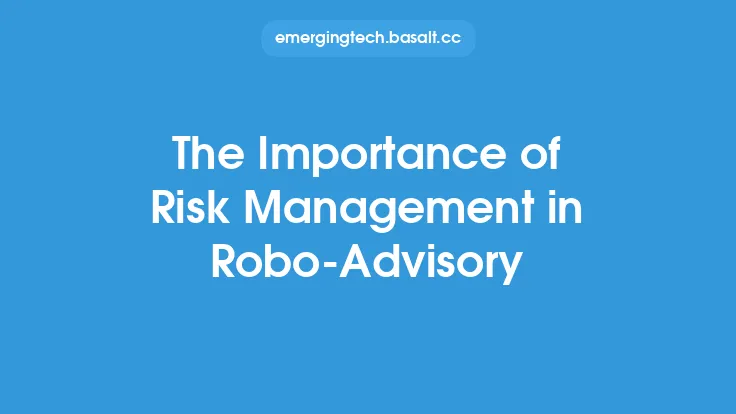The financial sector is a complex and highly regulated industry, with a multitude of rules and guidelines in place to protect consumers, prevent financial crimes, and maintain stability in the market. However, the sheer volume and complexity of these regulations can make it difficult for financial institutions to ensure compliance, leaving them vulnerable to risks and threats. This is where regtech, a subset of fintech, comes into play. Regtech, short for regulatory technology, refers to the use of technology to facilitate regulatory compliance and risk management in the financial sector.
Introduction to Regtech and Risk Management
Regtech and risk management are closely intertwined, as the primary goal of regtech is to help financial institutions identify, assess, and mitigate risks associated with regulatory non-compliance. Regtech solutions leverage advanced technologies such as artificial intelligence, machine learning, and data analytics to monitor and analyze large amounts of data, identify potential risks, and provide real-time alerts and notifications. This enables financial institutions to take proactive measures to mitigate these risks, reducing the likelihood of non-compliance and associated penalties.
Types of Risks in the Financial Sector
The financial sector is exposed to a wide range of risks, including credit risk, market risk, operational risk, and regulatory risk. Credit risk refers to the risk of default by borrowers, while market risk refers to the risk of losses due to fluctuations in market prices. Operational risk, on the other hand, refers to the risk of losses due to inadequate or failed internal processes, systems, and people, or from external events. Regulatory risk, as the name suggests, refers to the risk of non-compliance with regulatory requirements, which can result in fines, penalties, and reputational damage.
Regtech Solutions for Risk Management
Regtech solutions for risk management can be broadly categorized into several types, including compliance management, risk assessment, and audit and reporting. Compliance management solutions help financial institutions manage regulatory requirements, track changes to regulations, and ensure compliance with relevant laws and regulations. Risk assessment solutions, on the other hand, help identify and assess potential risks, providing a comprehensive view of the risk landscape. Audit and reporting solutions, meanwhile, provide real-time visibility into regulatory compliance, enabling financial institutions to identify and address gaps in compliance.
Key Technologies Used in Regtech
Several key technologies are used in regtech, including artificial intelligence, machine learning, data analytics, and cloud computing. Artificial intelligence and machine learning are used to analyze large amounts of data, identify patterns, and predict potential risks. Data analytics, meanwhile, is used to provide insights into regulatory compliance, risk management, and operational efficiency. Cloud computing, on the other hand, provides a scalable and secure platform for regtech solutions, enabling financial institutions to quickly deploy and scale regtech solutions as needed.
Benefits of Regtech in Risk Management
The benefits of regtech in risk management are numerous, including improved regulatory compliance, reduced risk, and increased operational efficiency. Regtech solutions help financial institutions stay on top of changing regulatory requirements, reducing the risk of non-compliance and associated penalties. By identifying and assessing potential risks, regtech solutions also help financial institutions mitigate risks, reducing the likelihood of financial losses. Additionally, regtech solutions provide real-time visibility into regulatory compliance, enabling financial institutions to identify and address gaps in compliance, and improve operational efficiency.
Implementation of Regtech Solutions
Implementing regtech solutions requires a structured approach, including planning, implementation, and monitoring. The first step is to identify the specific regulatory requirements and risks that need to be addressed, and to select a regtech solution that meets these needs. The next step is to implement the regtech solution, which may involve integrating it with existing systems and processes. Finally, the regtech solution needs to be continuously monitored and updated, to ensure that it remains effective in managing regulatory compliance and risk.
Challenges and Limitations of Regtech
While regtech has the potential to revolutionize risk management in the financial sector, there are several challenges and limitations that need to be addressed. One of the main challenges is the complexity of regulatory requirements, which can make it difficult to develop regtech solutions that meet these needs. Another challenge is the need for high-quality data, which is essential for regtech solutions to be effective. Additionally, regtech solutions need to be scalable and secure, to ensure that they can handle large amounts of data and protect sensitive information.
Future of Regtech in Risk Management
The future of regtech in risk management is promising, with several trends and developments expected to shape the industry in the coming years. One of the main trends is the increasing use of artificial intelligence and machine learning, which is expected to improve the accuracy and effectiveness of regtech solutions. Another trend is the growing adoption of cloud computing, which is expected to provide a scalable and secure platform for regtech solutions. Additionally, the use of data analytics is expected to become more widespread, providing insights into regulatory compliance, risk management, and operational efficiency.
Conclusion
In conclusion, regtech has the potential to revolutionize risk management in the financial sector, by providing a range of solutions that help financial institutions manage regulatory compliance and mitigate risks. By leveraging advanced technologies such as artificial intelligence, machine learning, and data analytics, regtech solutions can help financial institutions identify and assess potential risks, and provide real-time alerts and notifications. While there are several challenges and limitations that need to be addressed, the benefits of regtech in risk management are numerous, including improved regulatory compliance, reduced risk, and increased operational efficiency. As the financial sector continues to evolve, regtech is likely to play an increasingly important role in managing regulatory compliance and risk, and in maintaining stability in the market.





